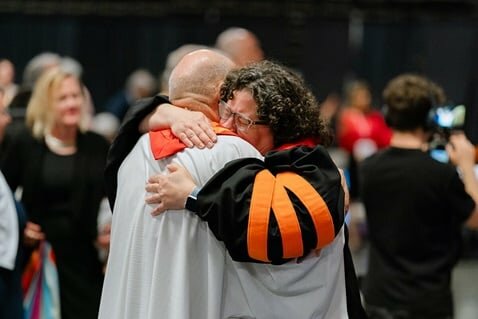When Apologies Really Mean It, Forgiveness Flows

By Linda Hart Green
Saying “I’m sorry” is hard. I am talking about the kind of sorry that does something about the hurt or wrong that was caused. This is called “restitution” or “making amends.”
The Bible talks a lot about forgiveness and making things right in relationships. The spiritual but not religious 12 Step movement incorporates into their process of recovery a system of admitting wrongdoing, confessing it and making amends. See Steps 5, 8, 9 and 10 in the “Big Book of AA” at Recovery.org.
I read a novel this week titled “Take My Hand” by Dolen Perkins-Valdez, which is loosely based on the true story of Minnie Lee and Mary Alice Relf, ages 12 and 14, who were involuntarily sterilized by a federally-funded agency in a clinic in Montgomery, Alabama in 1973.
The story goes back and forth in time from 1973 to the present, chronicling the experience of the girls through the eyes of their young nurse who uncovered the injustice done to the girls. She brought the situation to the attention of the law. Volunteer lawyers worked hard to uncover evidence. They uncovered that thousands of poor Black women across the South had been sterilized without informed consent. They won the case against federal agencies that permitted the funding for these surgeries without proper guidelines.
The nurse became an OB-GYN doctor who fought for reproductive justice for women for her whole career. However, she could not shake the guilt over what happened to the girls she had first met. It haunted her for decades. It changed her own relationships. She never married. She blamed herself for not probing deeper and sooner into the practice of giving shots of Depo-Provera to young, poor, Black women and to frequent sterilization without their informed consent. She reasoned that simply following orders was no excuse. As Maya Angelou says, “Do the best you can until you know better. When you know better, do better.”
Forty years later, the nurse found peace when she looked up those two girls, old women by now, and spoke her true feelings and stated her apologies. She was from a middle class Black family with education and privileges. She realized she had stereotyped them and other poor Black people from her own community. Blindly trusting institutions to do the right thing and hiding evidence from one’s own eyes was no excuse, she reasoned. It’s never too late to make amends.
Issues, like those in the novel, are still with us. On Nov. 5, Florida voters have an opportunity to make amends to the women in our state by voting “yes” for Amendment 4 to the state constitution that would provide the right to abortion before fetal viability or when necessary to protect the patient's health, as determined by the patient's healthcare provider. Advocacy groups were able to gather enough valid petitions to get the amendment on the ballot.
Individuals, organizations, institutions and governments make mistakes and can make amends. There are recent examples of an institution making amends in the United Methodist Churches in the U.S. Like many Protestant denominations, the United Methodists have been wracked for decades by controversy over the issue of homosexuality as “contrary to Christian teaching.” Very recently, at the United Methodist Churches General Conference nationwide, the voting body reversed its ban on the ordination of LGBTQ clergy and the blessing of same-sex unions.
In an astonishing act of making amends for an institutional church, the Methodist Conference of Eastern Pennsylvania and Greater New Jersey reinstated the ordination of Rev. Elizabeth Stroud, who had been stripped of her ordination credentials 20 years prior by that same body in 2004. In 2003, she admitted in a sermon that she was in a committed same-sex relationship while she was a pastor. Her own peers and other laypeople put her on trial for this admission and in 2004, voted to withdraw her credentials. Rev. Stroud moved on with her life, earning a Ph.D. and teaching. Because the church law was recently reversed, she could be reinstated.
At the most recent meeting of that conference, she was formally reinstated. What a joyful, emotional moment that was! The photo you see with this commentary is of her tearfully hugging her bishop after the ceremony. In an act of humility, when she appeared on the dais, the bishop knelt before her. She put her hands on his shoulders and prayed with him. The hundreds of worshippers attending the service sang:
“Draw the circle wide,
Let this be our song:
no one stands alone.
Standing side by side,
draw the circle, draw the circle wide …”
God the still-point of the circle
Round you all creation turns
Nothing lost but held forever
in God's gracious arms.
Let our hearts touch far horizons
So encompass great and small
Let our loving know no borders
Faithful to God's call.
Let the dreams we dream be larger
Than we've ever dreamed before
Let the dream of Christ be in us
Open every door!
Draw the circle wide,
Let this be our song:
no one stands alone.
(Hymn by Gordon Light and Mark Miller)
Let’s do the hard work individually, and as a community, and “draw the circle wide.”





